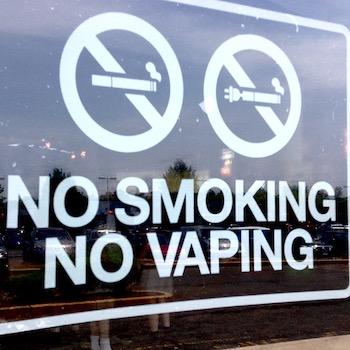Vaping devices such as e-cigarettes should not be used for fun. Getting oneself addicted to nicotine is not a smart idea. That is why these devices should not be used by non-smokers, particularly young people. Instead, the only legitimate use is as medical devices to help smokers quit. If used exclusively in that way, vaping can be a powerful tool in the public health battle against tobacco*.
Unfortunately, scientific data and logic are missing from the public debate over vaping. Worse, two of the organizations we entrust to protect our health, the FDA and CDC, have royally screwed up their policy on the safety of vaping.
FDA Warns Juul for Claiming that Vaping Is Safer than Smoking
On Monday, the FDA issued a warning letter to Juul. The agency is concerned that Juul marketed its product as being safer than cigarettes:
"Referring to your ENDS products as '99% safer' than cigarettes, 'much safer' than cigarettes, 'totally safe,' and 'a safer alternative than smoking cigarettes' is particularly concerning because these statements were made directly to children in school."
The FDA is conflating two different issues in that statement: (1) The safety of vaping devices; and (2) Marketing to children. The latter is unequivocally wrong, and the FDA is correct for bringing down the hammer on Juul. However, the FDA's hesitation to accept the scientific data on vaping is befuddling.
Vaping helps smokers quit. This isn't just anecdotal. A research paper by authors from the University of East Anglia published in the Harm Reduction Journal concluded "that vaping is a viable long-term substitute for smoking, with substantial implications for tobacco harm reduction." Furthermore, in an accompanying press release, one of the authors noted, "[V]aping may also encourage people who don't even want to stop smoking, to eventually quit." Another paper reached a similar conclusion.
In the United Kingdom, two hospitals have opened vaping shops to nudge smokers into quitting. Yes, really. Why? Because their healthcare system believes that vaping is 95% less harmful than smoking. Surely, American e-cigarettes aren't different from British ones.
CDC Insanely Warns Smokers Against E-Cigarettes
The FDA's announcement was shabby enough. But, last week, the CDC put out a statement that actually harms public health. The organization warned people, including smokers, against e-cigarettes:
While this investigation is ongoing, if you are concerned about these specific health risks, consider refraining from using e-cigarette products.
...
Adult smokers who are attempting to quit should use evidence-based treatments, including counseling and FDA-approved medications. If you who need help quitting tobacco products, including e-cigarettes, contact your doctor.
The first part is an absurd over-reaction. The health problems and deaths that have been linked to vaping (which we will discuss below) are rare exceptions due to misuse of the product. It would be like recommending that the public stop using scissors because some people poke their eyes out while running with them.
The second part is problematic because the CDC is implying that there is no evidence that vaping helps smokers quit. But there is plenty of it. And calling e-cigarettes "tobacco products" is likewise absurd. They don't use tobacco.
So, Why Is Vaping Sickening or Killing People?
There have been several stories in the media recently about vapers who either became sick or died. What's going on? A lot of different things that are all being (improperly) lumped together.
In one instance, a vaper suffered a collapsed lung. But as Dr. Chuck Dinerstein explained, that has nothing to do with vaping. Several hundred others have developed severe respiratory problems, and five have died. The vast majority appear linked to vaping THC-infused oil or some other product purchased off the street.
THC is not soluble in water, so it has to be dissolved in oil. The oil of choice is vitamin E acetate. That sounds nice -- we add vitamin E to hand lotion -- but vitamin E is meant to go in your stomach, not your lungs. Inhaled oil can trigger lipoid pneumonia. (For the chemistry behind this phenomenon, read my colleague Dr. Josh Bloom's article.) Similarly, products purchased from the local black market may contain chemicals that are unsafe.
While an investigation is ongoing into the exact nature of the problem, so far, the likeliest explanation is that improper use of vaping devices has led to some people getting sick or dying. But that sort of nuance isn't governing the thinking of the FDA or CDC, both of which are allowing myths and fear-mongering to drive their policies and public statements.
ACSH's Recommendation on Vaping
Here's the bottom line:
- If you are a smoker, switching to vaping may save your life. (While nicotine is an addictive substance, it is the combustion products of tobacco that cause the most serious harmful effects of smoking. Vaping has fewer of these substances.)
- If you are a non-smoker, do not begin smoking or vaping.
- Vaping devices like e-cigarettes should be thought of as medical devices meant to help smokers quit.
- Never add anything to a vaping device other than the liquid provided by the manufacturer.
*Note: Our critics (actually, they're more like trolls than critics) point out that ACSH has accepted money from tobacco companies. That is true. And then we use that money to tell people never to smoke and only to vape if they are trying to quit smoking. Once again, the "follow the money" argument makes absolutely no sense.




